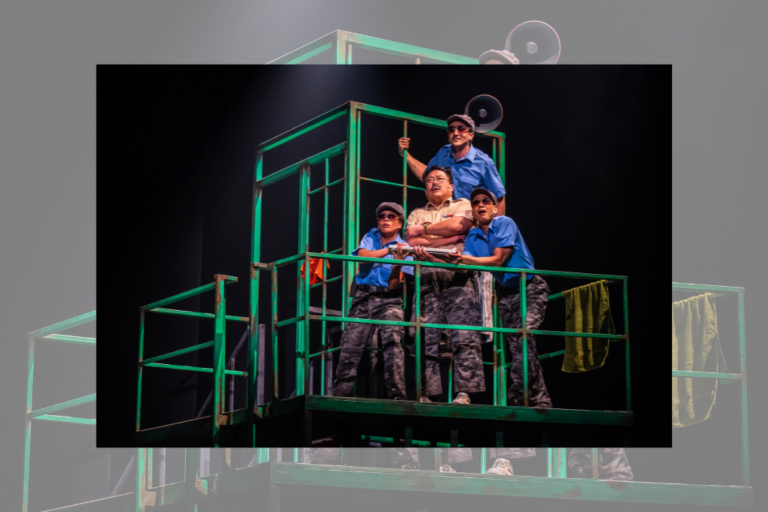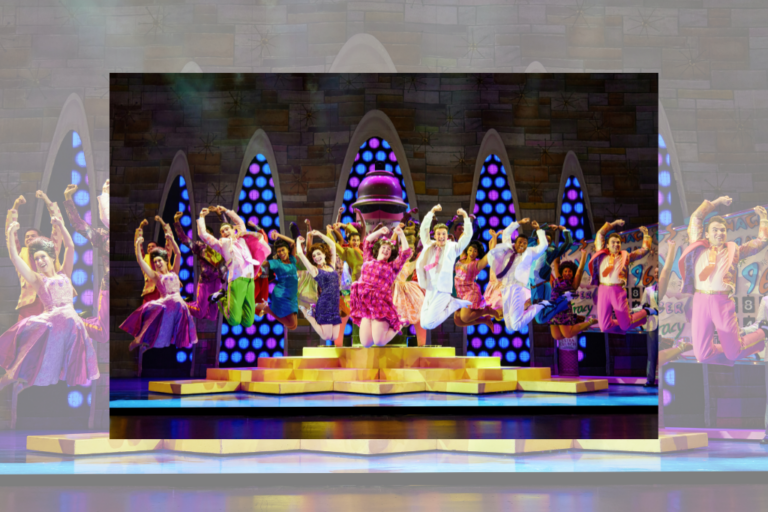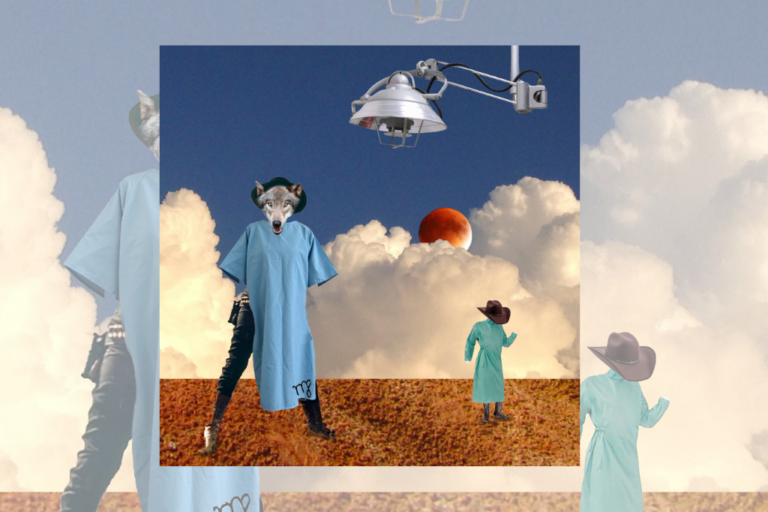REVIEW: Snow in Midsummer is a timeless, brilliant tragedy
In an old, crumbling building in the middle of town, a young widow is selling palm weavings to make ends meet. As she grows tired, a crooning, drunken soldier stumbles in and makes unsettling eye contact with the widow. He chases her out of our sight — this is our introduction to New Harmony.
Snow in Midsummer, by Frances Ya-Chu Cowhig, follows that widow, Dou Yi (Lindsay Wu), as she haunts New Harmony in pursuit of justice for her wrongful execution. Accused of the murder of military leader Master Zhang (John Ng), she curses the factory town to three years of drought and snow in midsummer if she is truly innocent.
Three years after Dou Yi’s execution, the townspeople, adjusted to their unnaturally barren conditions, welcome Tianyun (Donna Soares), the soon-to-be owner of the town’s factories. With her Apple Watch and spirited 9-year-old, Fei Fei (Eponine Lee), Tianyun is ready to bring economic growth to New Harmony. But the sins of the town, as well as her traumas, unravel as she pledges to Dou Yi’s spirit to understand the whole truth.
Snow in Midsummer is based on 13th-century Yuan-dynasty drama, The Injustice to Dou Yi that Moved Heaven and Earth, attributed to Guan Hanqing. Originally commissioned by the Royal Shakespeare Company for their Chinese Translations Project, Cowhig’s play premiered in Stratford-upon-Avon in 2017. This fall, the National Arts Centre’s English theatre is presenting the Shaw Festival’s beautiful production of the play, which premiered in Niagara-on-the-Lake this summer. Directed by NAC English Theatre artistic director Nina Lee Aquino, the gorgeous details of the production allow audiences to feel the gravitas of every character.
New Harmony is a post-apocalyptic town that doesn’t feel so “post” — the drought is dire, and a nuclear-like disaster forces everyone to evacuate from their homes near the end of the play. And yet, many townsfolk dismiss the destruction, accepting it as natural evolution, and brushing off any mentions of Dou Yi’s curse as superstition. The ensemble cast exchange jabs, references, and rumours about the climate and unequal conditions that I’ve heard in my own life, highlighting the topicality of the script.
This resonance is furthered by the work of costume designer Joanna Yu, who’s done a fantastic job establishing the social classes of the ensemble through clean, crisp uniforms and faded, tattered rags. Dou Yi’s garments radically change, thanks to an offering by Fei Fei, which allows her to further establish herself as a force to be reckoned with.
The physical production elements which depict this little town are just as imaginative and eye-catching as the performances. The central stage, designed by Camellia Koo, further illustrates the industrial nature of New Harmony. It is small, intimate, and crumbling, forcing characters to face the physical ramifications of their choices. Koo and lighting designer Michelle Ramsey beautifully uplift scenes of confrontation and emotion, flashing in times of strife or solace — that passion is best exemplified by scenes of Dou Yi’s execution, when it first begins to snow.
Lindsay Wu’s performance as the ghostly widow is as commanding as it is heartbreaking. As the spirit of the play, her voice echoes throughout the stage as she makes sure each of her words hits with purpose. For me, Wu embodied every woman I have witnessed face injustice at the hands of powerful men — endlessly scorned for just existing.
Dou Yi was a poor teenager when she was executed, simply trying to feed herself and her mother-in-law, yet no one took pity on her. These scenes from the play echo real-life poverty — scenarios in which we have accepted begging and loneliness as normal. Dou Yi cries for her mother-in-law, Mother Cai (Manami Hara), an elderly masseuse. But when Tianyun receives a massage, all three confront each other about motherhood. Both Soares and Hara are sharp, casting accusations against each other that stopped my heart.
Hara additionally plays Nurse Wong, the town’s barkeep, with secrets of her own. Wong is welcoming to all — with one exception. In these dual roles, Hara brilliantly portrays the two matriarchs; while Mother Cai is slow and frail, Hara is blunt, demanding that Tianyun accept responsibility for her actions. Yet Wong, in her more vulnerable moments, pushes blame onto an innocent girl, rather than her own family. We see this lively barkeep on her knees, holding her child, begging those in power to spare their lives. These physical dynamics make the performances much more compelling (the production’s movement designer is Kimberley Rampersad).
Handsome Zhang (Michael Man), the factory manager, is one of the central recipients of Dou Yi’s vengeance. Preparing to travel with his lover Rocket (Jonathan Tan), tragedy hits the happy couple hard, with Handsome bearing both the loss of his lover and the internalized guilt about his late father, Master Zhang. The chemistry between Man and Tan is tender, yet you feel its fragility once the truth of their entanglement in Dou Yi’s life is revealed. Man especially delivers a jaw-dropping performance towards the end of the play, as the audience learns the truth about Handsome and Dou Yi’s demise.
When I left the National Arts Centre, my heart felt heavy as I grappled with the weight of the play. And then, on that uncharacteristically warm October night, it began to rain. There was no curse put upon Ottawa (at least none that I knew of), but it felt cleansing as scenes from the play swirled in my mind. The injustices enacted in the play frustrated me, as did the negligence that led to the town’s destruction. But as Tianyun says to her daughter: You have a strong voice, and it is your responsibility to use it.
Snow In Midsummer runs at the National Arts Centre until November 9. Tickets are available here.
Intermission reviews are independent and unrelated to Intermission’s partnered content. Learn more about Intermission’s partnership model here.















Comments